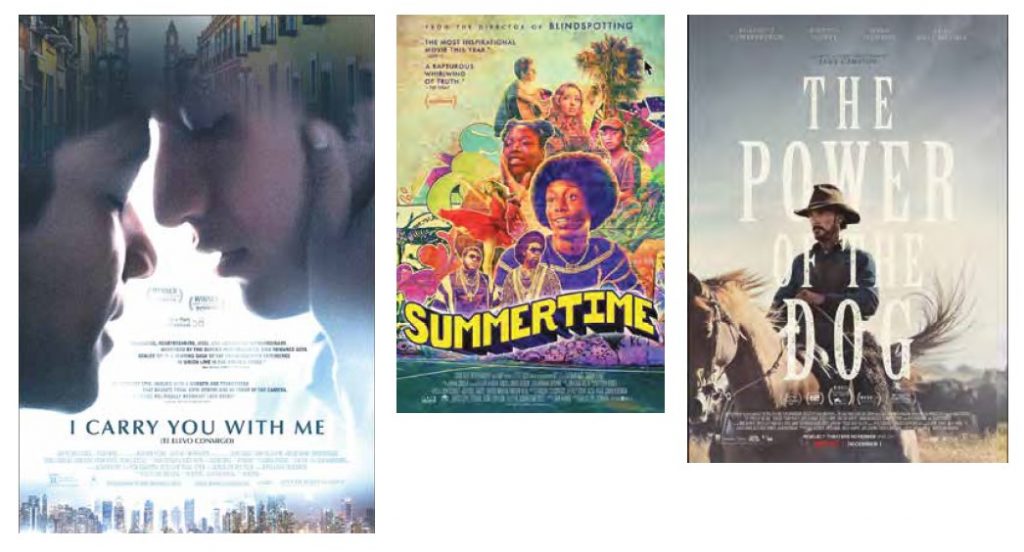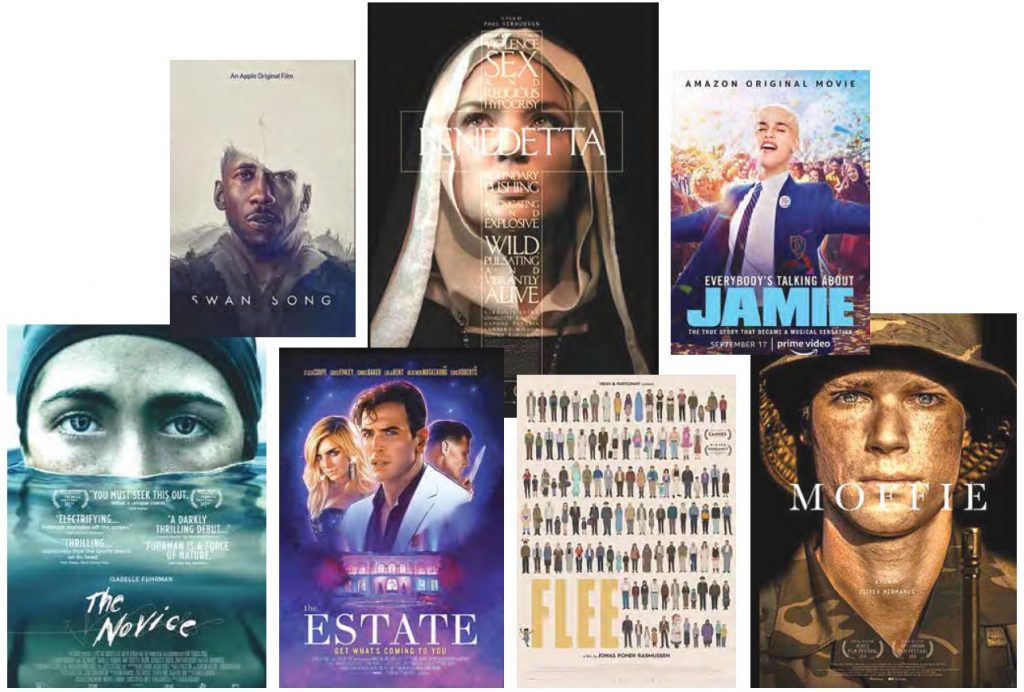
By Gary M. Kramer–
Looking back at the year in queer cinema, there were some absolute highlights, like the animated documentary Flee (forthcoming in January), about a gay Afghan man’s exile. And there were some lowlights, most notably, the screen adaptation of Dear Evan Hansen, an absolutely excruciating experience.
One of the most wonderful queer films this year was Summertime, a poetry-infused musical about queer and BIPOC youth in Los Angeles set over a single day. Infectious and emotional, this film was joyful from start to finish.
Udo Kier delivered one of the best performances of the year as a gay hairdresser in Swan Song, Todd Stephens’ elegiac homage to a man he knew in his hometown of Sandusky, Ohio. Likewise, Benedict Cumberbatch’s powerful turn as a repressed gay man in The Power of the Dog, is likely to secure the actor another Oscar nomination.
Give breakout performance kudos to Max Harwood, who sashayed his way into viewer’s hearts as the title character in Everybody’s Talking about Jamie, the fabulous screen adaptation of the West End musical.
Chris Baker also made an impression as the writer/director of the gay comedy-thriller The Estate, which rivals Louise Linton’s bisexual comedy-thriller Me You Madness as the campiest film this year.

Two strong gay-themed dramas that deserved more attention this year were Moffie, about a teen in the military in 1981 South Africa, and I Carry You with Me, about a chef who leaves Mexico for the U.S. and how that impacts his relationship.
Dishonorable mention goes to Joe Bell, a well-meaning, but clumsy, drama about a father trying to raise awareness about the dangers of bullying LGBTQ youth, and Falling, Viggo Mortensen’s painful directorial debut about a gay son (Mortensen) and his cantankerous dad (Lance Henriksen).
Lesbian cinema had a few memorable entries as well this year. Isabelle Furman went all in with her performance as The Novice, about a queer college rower with self-destructive tendencies. Virginie Efira likewise gave a no-holds-barred performance as the titular character Benedetta, who explores her sapphic side in Paul Verhoeven’s overheated nunsploitation drama.
The World to Come was a beguiling romance between Abigail (Katherine Waterston) and Tallie (Vanessa Kirby), set in upstate New York, 1856. In contrast, The Affair poorly depicted the sexual relationship that developed between two friends, Liesel (Hanna Alström) and Hana (Carice van Houten), in 1930s Czechoslovakia.
Lesbian characters were also visible in several ensemble films this year. The Humans, byout gay writer/director Steve Karam, featured Aimee (Amy Schumer), a woman mourning her ex in the adaptation of Karam’s Tony Award-winning play, and Silent Night featured a lesbian couple, Bella (Lucy Punch) and Alex (Kirby Howell-Baptiste), who gather for the end of the world with their friends.
Bisexual characters continue to get only modest screen time. Notably, there was Tove, a handsomely mounted biographical drama that chronicled the life of Tove Jansson (Alma Pöysti), the bisexual artist and author of the Moomin books.

Two intoxicating romancesfeatured polyamorous relationships. Ma Belle, My Beauty, set in the sunny South of France, has Lane (Hannah Pepper-Cunningham) visiting her former lovers Bertie (Idella Johnson) and Fred (Lucien Guignard), who are now married to each other. Show Me What You Got features Christine (Cristina Rambaldi), Nassim (Neyssan Falahi), and Marcello (Mattia Minasi) meeting and mating in Los Angeles (and in luminous black and white).
Trans and genderqueer characters were at the center of several films this year. Together, Together was a warm comedy-drama with trans actress Patti Harrison as a surrogate for a single man (Ed Helms). The poignant drama Cowboys has Troy (Steve Zahn) and his preteen son Joe (Sasha Knight) on the run in the Montana wilderness because Joe’s mother does not accept her child’s gender dysphoria and presenting as male. Little Girl by Sébastian Lifshitz charts a year in the life of Sasha, an eight-year-old who was born in a boy’s body, but says, “When I grow up, I’ll be a girl.” The provocative North by Current,by trans filmmaker Angelo Madsen Minax, takes a reflexive approach to identity-formation by investigating his own family as they cope with the aftermath of the death of his niece.
Among the best documentaries this year were out gay director Todd Haynes’ The Velvet Underground, which provided a deep dive into Lou Reed and John Cale’s band with terrific archival footage and memorable talking heads. Wojnarowicz, about the controversial political activist and multimedia artist, was another outstanding documentary that deftly illustrated the rage Wojnarowicz felt in his life and how he used it to create art and raise awareness.
Two documentaries, Ailey and Can You Bring It: Bill T. Jones and D-Man in the Waters, showcased the important contributions of these groundbreaking Black gay choreographers and their contributions to modern dance. Pauli Murray was a fascinating profile of the underknown queer human rights activist, lawyer, poet, and reverend, and Mayor Pete, about the political campaign of Pete Buttigieg, was also winning.
Here is to an even stronger 2022.
© 2021 Gary M. Kramer
Gary M. Kramer is the author of “Independent Queer Cinema: Reviews and Interviews,” and the co-editor of “Directory of World Cinema: Argentina.” Follow him on Twitter @garymkramer
Published on December 16, 2021
Recent Comments